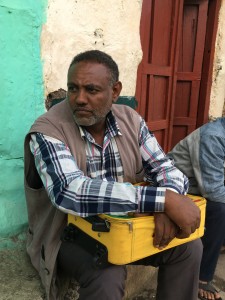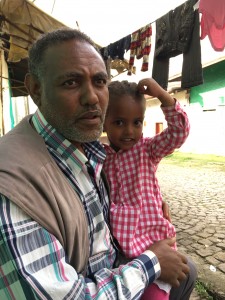[Stories of Origin] Battling 'evil' stereotypes, pregnancies, and abuse in the Gulf
Some have returned and some have families fretting over their well being. In the third instalment of a four-part series, we look at the stories the returnees and families tell, and the stories that remain untold – from unplanned pregnancies to unmet dreams.
By 10 a.m. you’ve lost count of the number of cups you’ve had. The Bunna Tetu – coffee ceremony– is sacrosanct. A few polite ‘Nos’ go a long way in keeping the caffeine overdose in check.
Halewya Said and her mother don’t care for the ‘no’ and thrust a cup of steaming coffee and a slice of soft sponge cake into my hands, displacing pen and notepad.
She has returned to Ethiopia after 10 years in Saudi Arabia. With some business skill training and help with start-up capital, she now runs a bakery that provides cakes to different shops. The money she had saved up in her decade abroad was lost in a bad investment.
In 2005, barely 17, she went to Saudi on an Umrah visa and stayed on undocumented for a decade.
“I was so grateful to come back and see my mother after 10 years. She was very ill. But I was so confused. Dessie had changed so much. I couldn’t recognise it,” she says of the place she calls home.
“I was excited too. Everything was different from what I was used to. The air. The utensils in the kitchen, how we cook.”
“Ethiopians have a bad name because of a few. Some habeshas are considered thieves and killers… I am not like that.
Dessie is 20 km uphill from Kombolcha, and has no mainstream industry to sustain it. Yet, you see long stretches of markets and exchange houses. It’s a town pieced together on migrant hopes and money.
“I went with my brother the first time. He stayed there for three years. But I also have sisters who have lived there since 1994 and 2000. They helped me find employers, to move employers, to stay safe, to dodge the police net, as I had no papers.”
Halewya is matter-of-fact about her experiences, there’s no self-pity, no blame. The first house she worked in she was paid only 600 riyals, but by the time she was with her fifth employer she was earning 1500 riyals and getting a day off every fortnight.
“I was never scared of my status. Just because I didn’t have proper papers I did not hold back while asking for good terms.”
She continued to stay in Saudi to pay for her mother’s treatment and for the care of her daughter. “Then they announced the amnesty in 2013, and it was time to come back.”
So in the mass deportation of December 2013, she came back to Dessie, to make it home, despite how foreign it looked.
“I had saved up 50000 birrs (less than USD1800) and opened a petty shop. It was a bad decision, without a proper plan. Now with help from some (development) agencies, I have a new business going.”
“Because of my religion, people had a positive attitude towards me. Some (employers) are not, they are very bad. I tried telling them, the people there, that even if we are poor, we have families. We don’t have modern houses but still have a home. We have fresh food and air. May not be as rich as you, but still have a life,” Halewya bites back her tears.
“Ethiopians have a bad name because of a few. Some habeshas are considered thieves and killers… I am not like that. My friends and family are not like that. We as a people are good. But how do we make them understand that?”
The negative narrative about Ethiopians disturbs her, and she wonders how that can be changed.
“I am a success. I learnt a lot that I use now. I understand social life. Even if financially I didn’t do well, I did do well with my knowledge,” she taps her forehead.
Halewya is how Bizuye Fentaw would like her daughter to turn out – a home, a thriving business, confidence.
It is difficult to believe the tall and youthful Bizuye is the mother of eight children. Momina, who is in the Saudi port city of Jizan, is her seventh child.
Bizuye’s home is an altar to the goods Gulf money can buy. Television, stereo system, refrigerator, all covered in the lacy plastic dust covers. The modest facade of the home belies the relative affluence inside.Hers is a rare home that managed to make the best of having family in the Middle East. The kind of home that school girls from impoverished backgrounds, like Imaan, aspire to.
Momina went to Jizan in 2013, when she was just 18 She came home for a holiday last year for four months.
Bizuye’s sister has lived there for 20 years with her family and runs a salon, which now employs Momina. She earns 10,000 birrs a month and sends money home every quarter or so.
“I am building a house for her. She got engaged last year to a boy who works in a garage. Once the house is built, and some money put away, then she will come back for good,” says Bizuye.
She knows that there’s no guarantee Momina’s luck will hold.
“It’s difficult to talk about her daughter’s pregnancy in front of the neighbour. They will gossip.”
Mother’s guilt
“My sixth daughter went to Dubai in 2010. She worked for two years, was not paid for one year, and suffered so much abuse. She was paid only 2,000 birr a month when she was paid. Finally, she went to the police and she was sent back empty-handed.”
In the room tucked away behind a light curtain are her children and grandchildren. She gazes distractedly in the direction of the muffled banter inside.
“I would not have sent her if she were not working for her aunt,” the mother says, offering an unsolicited justification, as she sees us out.
Halewya’s mother who wordlessly refilled the coffee cups, interjected only once, to voice similar misgivings. “My children helped me with my medical treatment. All those stories I kept hearing I was so worried, so guilty. ”
Fatima Hassan bears a similar burden – the guilt of the left behind.
Fatima is just 55 and something of an expert on what it means to have your young girls live in a strange country.
She is tired of worrying about her daughters but doesn’t see an out anytime in the near future. Of her seven children, two are abroad. Rahma lived in Saudi for 12 years and came back with a son, who is now eight.
“More than two years ago, she went to Dubai.”
When the ban was in place.
Fatima laughs mockingly. “Ban? The only thing that happens is that the price goes up. Doesn’t stop anyone, and the black market becomes profitable. Rahma paid an agent 15,000 birrs to get her to Dubai. ”
There’s a flurry of activity outside a small window, adjacent to the entryway of her house. A small stool, a large copy machine and a printer are cramped into the space of a closet. A young woman is running the shop. A local government office in the vicinity ensures a steady flow of customers.
The front room of the house, from which the shop has been culled out, has a substantial area set aside for the coffee ceremony Fatima presides over.
Babies Abroad
“First time she (Rahma) wanted to come back because of the baby. Now the contract is up and she wants to return, but they are not allowing her to.”
When Zeba’s name is brought up Fatima looks even more worried, as she has no idea when her daughter will be able to return from Jeddah. Even the amnesty (ongoing at the time of the interview) would not have helped her, Fatima fears.
Zeba was just 16 when she went to Saudi five years ago.
“She ran away and is pregnant. Due any time now… she couldn’t seek amnesty. She is married and lives in her own rented room there. We don’t know what will happen to her, or the baby.”
It’s not easy on Fatima that two of her daughters ended up pregnant while abroad, even though in the community her family is no different from many others.
“Usually the girls send their children with others who are returning and stay back longer to earn more. Then we grandmothers take care of them… they are our babies. But people talk.”
Halewya also gave birth to a daughter in Saudi, who her sister brought back to Dessie to be cared for by the grandmother.
“I was engaged to someone before I went. He also came to Saudi and was without papers. We had a child. After pregnancy, we stayed together.”
It’s a story you hear often, full of thinly-veiled euphemisms. The fiancé or the husband in Saudi, the child born abroad in secrecy, brought back home to a grandparent… one could read between the lines or accept the story.
Seven years ago Iman, just 16, went to Saudi through a broker. Her mother Ashala last heard from her five months ago. “She came here once, and bought this,” she says, unimpressed, pointing to a television that’s on when we enter and is likely to remain on through the day. “She never sends money regularly.”
I estimate not less than 30 percent of those who come to Agar are sexually abused.”
Their home is one part of a room in a particularly abject part of the slum. A tin sheet separates their family from the one next door.
Iman is undocumented and works illegally in Saudi, her father comments, eyes still on the drama on TV.
“She called once five months ago. When she had a baby. We haven’t heard from her since,” says Ashala, finally beginning to open up.
A neighbour walks in and makes herself comfortable, inveigling herself into the private conversation.
Ashala clamps up, her answers becoming more and more non-committal.
“No, we haven’t tried calling her. She will call when she wants to.”
The community worker whispers, “It’s difficult to talk about her daughter’s pregnancy in front of the neighbour. They will gossip.”
Agar Ethiopia, a rehabilitation centre, houses many women who return with a child in tow.
Its Executive Director, Abera Adeba says, the lack of cultural awareness on both sides leads to harmful stereotypes too, like accusing Ethiopian domestic workers of black magic. “And I estimate not less than 30 percent of those who come to Agar are sexually abused.”
The evidence is in the mixed-race children at the centre. It's a reason why many of these women are not accepted back into their communities, and so continue living in limbo at the shelter.
It’s not just rape. Many women enter into nonmarital relationships that are decried as illegal across the GCC. With no access to reproductive healthcare in these countries and not enough knowledge of their laws pre-departure, the result is women find themselves in situations that can be criminalised.
Previous: “I want to escape”






